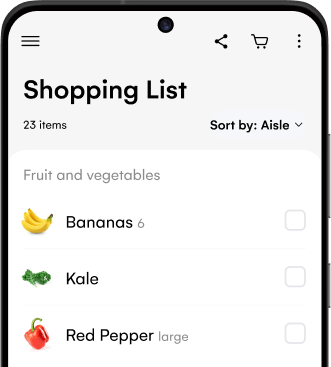Estimated reading time: 10 minutes
Do you find yourself ordering takeout or diving into the chocolate stash when you’ve had a bad day or you’re stressed out? You’re not alone. Emotional eating is a common battle.
Turning to food as a response to your feelings is known as emotional eating or stress eating. It’s something we all do sometimes – we might celebrate birthdays with meals and cake, turn to ice cream after a break up, or eat our favorite burger when we’re stressed about a work presentation.
Analyse nutritional information for any recipe

Given that we need food to survive, it’s not surprising that our bodies respond to food positively. Digging into something delicious turns on all the ‘reward’ systems in your body, and as a result, you feel good. But when emotional eating happens often and you’re using it as a coping mechanism, it can be problematic. Aside from the very real problem of overeating, especially on foods which are low in nutrients and high in calories, emotional eating can also start a destructive cycle of guilt and shame.

Eating plans often fail – not because they’re inherently flawed, but because they are designed with the idea that you already have conscious control over your eating habits. Unfortunately, logic doesn’t work when emotions come in and wreak havoc with the process!
Emotional eating and food cravings can be complicated
Food is such an integral part of our culture and social lives. How many of your most important memories feature food in one way or another? Chances are, it’s a lot of them. Family dinners, tasting new things on vacation, celebrating a birthday at a nice restaurant, or gathering at a barbecue in the sun. We celebrate with food, drop off food for people experiencing grief, pick up a favorite chocolate bar or make a childhood meal for those we love. Food is one of the many ways we form connections with people close to us, so it’s only natural that we develop an emotional connection to the food itself too.

Managing stress eating and emotional eating isn’t designed to rob you of an emotional connection to food. Instead, the aim is to reach a place where you can make conscious decisions about when and what you eat without feeling powerless or out of control.
Awareness of emotional eating
The first step to curbing emotional eating is gaining a deeper awareness and understanding of it. You could be an emotional eater if you:
- Eat more when you’re feeling stressed
- Continue eating even if you’re full
- Find yourself eating when you aren’t hungry to start with
- Eat to feel better or soothe yourself
- Use food as a reward
Before you can move past emotional eating, you have to be able to identify when you’re experiencing physical hunger and when you’re experiencing emotional hunger.
Emotional hunger can be powerful, so it’s easy to mistake it for physical hunger. But there are clues you can look for to help you tell physical and emotional hunger apart.
| Emotional Hunger | Physical Hunger |
|---|---|
| Comes on quickly/suddenly | Develops gradually |
| You crave specific foods (often salty, fried, or sweet) intensely | You’re hungry, but not necessarily for something specific. A chicken salad might sound as appealing as a burger |
| You still feel an urge to eat or snack when you’re full | Once you’ve eaten and are full, you feel satisfied |
| You feel guilt, self-hatred, shame, or other similar emotions after eating | You are satisfied without feeling negative emotions about yourself and your eating habits |
Recognizing common triggers for emotional eating
If you already know you tend to turn to food in times of frustration, sadness, or stress, you’ll also need to spend some time working out what your triggers are. What situations make you turn to food as a coping mechanism? Most emotional eating is linked to unpleasant feelings, but it can also be triggered by positive emotions – like when you reward yourself for doing a good job.

Some common root causes for emotional eating include:
- Stress (which is so common you probably call it stress eating instead!): stress produces cortisol, which can trigger cravings for salty, sweet, and fried foods.
- Sadness, boredom, depression, emptiness etc: sometimes, food becomes a way to keep yourself busy. It keeps you distracted and masks underlying feelings of dissatisfaction or sadness.
- Social situations: eating without conscious thought is easy in social situations. The (often calorie dense) food is there, other people are eating, you might be nervous or tense, and peer pressure can change how and what you eat.
Plan ahead and say goodbye to meal time madness

- Numbing: you might eat to push down certain unpleasant emotions that you don’t want to feel.
- Childhood habits and behaviors: you may find yourself punishing or rewarding yourself with food in adulthood because you were given sweets after a good test, offered chocolate if you were sad, or had food used as punishment. Or you might use food as a way to reconnect and relive nostalgic memories.
It’s also a good idea to keep an ‘emotional eating diary.’ The goal here isn’t to induce shame or guilt, but to help you understand the link between your feelings and your eating habits.
Try to jot down some notes when you suspect you might be eating as an emotional reaction rather than a physical one.
Include what happened, how you felt before and after eating, and details about what you ate and how you ate it. For example, did you eat straight away? Turn to the pantry or order takeout? What type of food cravings were you experiencing?
Over time, you’ll start to notice patterns. Perhaps you overeat when you’re approaching a big meeting at work. Or maybe you always feel frustrated after seeing your family and end up reaching for the chocolate as comfort. Perhaps nervousness at social events triggers an urge to eat past the point of being full.
The more you understand your own behavior, the better. It’s much easier to change harmful habits when you know what triggers them.
Breaking the cycle of stress eating, cravings, and overeating

If it was easy to simply stop eating emotionally, we’d all be doing it. Nobody would ever have a problem with over or under eating, and most of us would be an ideal weight and maintain a healthy relationship with food. Of course, it isn’t as straightforward as that.
However, finding healthier ways to cope with and regulate your emotions can go a long way towards improving your relationship with food. Here are three steps which may help prevent stress eating from taking over on a regular basis.
1. Practise mindful eating
Eating is often done on autopilot, even when you’re physically hungry. Food cravings can often lead to us wolfing down a bar of chocolate or a meal without really remembering it or taking it in properly. Mindful eating helps you to become more aware of what you’re eating, how you’re eating, and why you’re eating – basically, it’s you turning your full attention to your food and staying in tune with yourself and your surroundings while you enjoy your meal.

How do you do it? Firstly, get rid of distractions like TV and phones so you can fully focus on your food. Take your time. Engage all of your senses. How does the food smell? What does it look like? Try to chew and taste each bite of food, appreciating the textures and tastes. Wait for a few seconds before taking another mouthful and savor each bite.
Over time, you’ll come to enjoy the sensation of eating but will also be more aware of the signals your body is sending you with regards to whether you’re hungry, full, thirsty, or something else.
2. Find an alternative coping mechanism
If food is a way to cope with emotions, it stands to reason that the key to beating cravings and emotional eating is finding another avenue to fulfil your emotional needs. Ultimately, the goal is find a more productive way to handle your emotions.
There’s no one size fits all. The way a busy businessperson deals with stress eating might be different to how a teenager copes with eating in times of sadness, for instance. And one person might find that being in nature helps them immensely, whereas another might prefer to hit the gym and sweat out their feelings.

However, here are a few ideas to get the ball rolling in terms of finding an outlet for when the food cravings hit and you know it’s your emotions talking rather than your physical hunger. Some of them may not work for you, and that’s fine.
- Stress – breathing exercises, meditation, yoga, or anything else which is calming and helps to clear the mind
- Sadness – gratitude journaling, listening to your favorite upbeat music, calling a friend or family member
- Boredom – finish a project, create a to-do list, tackle a chore, spring clean, read a book
- Anxiety and/or depression – spending time with loved ones and animals, reaching out to a support group, counsellor, or trusted friend
Finding another way to manage and deal with your emotions instead of turning to binge eating is hard. You may find that there are days where the cravings are too strong, and your progress might be up and down – that’s ok! Remember that you are making a lifestyle change, rather than restricting your eating.
3. Seek help
It can be very helpful to talk to a therapist or psychologist if you’re struggling with emotional eating. Often, they can reframe your thoughts, help you pinpoint underlying issues, and discuss strategies to help you break the cycle of stress eating, binge eating, or feelings of guilt associated with food. They can help equip you with coping mechanisms, help you to understand why you turn to emotional eating, and empower you to make different decisions around food and eatings.
Remember, you don’t need to have been diagnosed with an eating disorder to seek help in improving your relationship with food.
Changing your mindset can be a long and difficult process – but it’s worth it!
Words by Sophie Baker



